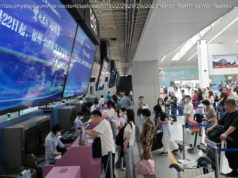“In the Name of the People” has become one of the most popular shows in Chinese history, with themes and scenes that mirror real life.
BEIJING — China ’s ruling Communist Party banned television dramas about politics and corruption from prime time more than a decade ago, apparently worried that they reflected reality a little too well. But its propagandists let loose this spring with “In the Name of the People, ” a slick, ostentatious, 55-episode series that has been called a Chinese version of “House of Cards.”
Assassins conspire to kill government investigators. Bribetaking officials flee the country to escape punishment. Scheming judges are caught in bed with foreign mistresses — and Chinese audiences are loving it. Ratings have been through the roof, and the show has garnered billions of views online, becoming one of the most popular television programs in Chinese history.
Despite this focus on bad behavior, “In the Name of the People” largely glorifies the party’s anticorruption efforts, portraying government investigators as folk heroes up against nefarious forces. This approach dovetails with the corruption crackdown that President Xi Jinping has used to cement both his grip on power and his own popularity.
Here’s a breakdown of five scenes from the show and what they say about China today.
At the core of “In the Name of the People” is the idea that corruption is omnipresent, capable of seducing even the steeliest of officials — and that only a strong government can contain it, certainly not democratic elections or a free press. This is one of the Communist Party’s favorite propaganda themes.
In this scene, an official named Zhao Dehan begs for mercy after the police discover the fortune he collected in bribes hidden in his home.
Mr. Zhao could recite the exact amount of his illicit gains: 239,995,400 renminbi, or about $35 million. But he says he is too ashamed to spend any of it, choosing to live in a modest apartment and ride his bicycle to work.
“My relatives have been farmers for generations, ” he says, standing by a refrigerator overflowing with cash. “I didn’ t dare spend a penny.”
The investigator who exposed Mr. Zhao’s misdeeds is unmoved, replying: “It’s such poor luck for Chinese farmers to have a bad son like you.”
Mr. Zhao’s humble appearance underscores the government’s message that corruption lurks everywhere, not just among the most powerful or flashy officials, and it recalls real-life cases. In 2014, for example, the authorities found $33 million in cash, bundled and weighing more than two tons, in the home of a low-level energy official. It took 16 mechanical bill counters to count the money, and four of the machines burned out in the process.
The government seems to be hoping that “In the Name of the People” can deter would-be swindlers: The show has become required viewing for local party officials in some areas.
The injustices suffered by ordinary workers at the hands of corrupt officials are front and center in the series. In this scene, workers at a textile mill stage a protest after learning that their factory has gone bankrupt, part of a scheme involving businessmen and local officials to force the factory to be demolished to make room for luxury housing.
“Defend the factory, defend ourselves!” workers chant as they wave torches. They pour gasoline on a barrier and light it on fire, leading to a chaotic scene in which several workers are injured.
Again, this scene mirrors reality. Labor protests have erupted across China in recent years as state factories have been sold on the cheap to private investors with political connections, often with few benefits for workers. The government has tolerated some protests but tries to defuse demonstrations and block criticism of senior party leaders.
In another realistic touch, the show’s fictional protest is live-streamed online and picked up by the foreign news media to the chagrin of local leaders. Livestreaming has become a cultural phenomenon in China, and aggrieved workers in China sometimes turn to foreign journalists because of the restrictions on the Chinese press.
The propagandists clearly want the audience to cheer for the upright party officials in the show who battle corruption. But many Chinese have embraced a different character instead, a local party chief named Li Dakang with a single-minded focus on economic growth.
Mr. Li discusses his philosophy in this scene, in which he speaks to the news media about the protests. Hoping to quell public outrage, he argues that China must push forward with economic development.
“There is nothing wrong with demolishing the old China, ” he says. “There will not be a new one without demolishing the old one.”
Mr. Li fails to notice corruption around him, and he sometimes neglects the negative effects of a headlong pursuit of growth. He does want to protect the environment, but it is his obsession with gross domestic product that has won him wide admiration among viewers and inspired internet memes. “Don’ t bow your head. The G. D. P. will drop if you do, ” one says.
Local party officials in China are largely judged on their success delivering economic growth. Critics say that has exacerbated problems such as pollution, inequality and corruption. But it has also fueled a historic expansion of prosperity, and Mr. Li’s popularity suggests many Chinese accept the trade-off and take pride in the nation’s economic progress.
Almost nothing in China screams “corrupt” like playing golf, a game long derided by the Communist Party as a bourgeois luxury of the West. In this scene, one of the chief villains, Qi Tongwei, a public security official, plays a round with his mistress.
“In the Name of the People” is filled with suggestions that Western decadence has corrupted Chinese officials.
In real life, Chinese often complain about “naked officials” who send their entire families abroad, sometimes with ill-gotten gains, and Mr. Xi has pressed a campaign t o hunt down Chinese officials who have fled to the United States and other countries and return them to China to face punishment.
Linking corrupt officials to the United States serves the party’s propaganda purposes, casting American leaders who refuse to extradite them as hypocrites and tarring democratic values by association.
In an early episode of the show, a deputy mayor escapes to Los Angeles after investigators learn that he has taken bribes. Onboard an airplane, he asks for Champagne. A flight attendant asks what he is celebrating. “Freedom, ” he replies.
Since coming to power in 2012, Mr.






